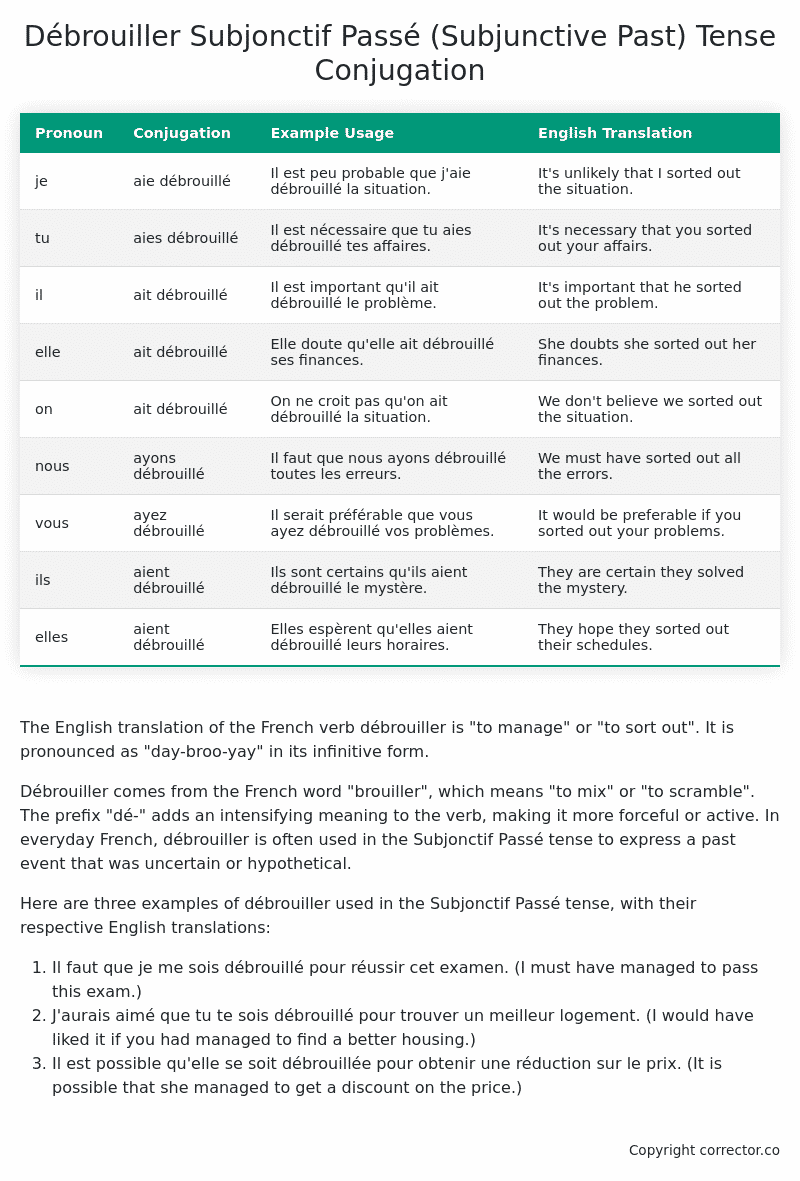Subjonctif Passé (Subjunctive Past) Tense Conjugation of the French Verb débrouiller
Introduction to the verb débrouiller
The English translation of the French verb débrouiller is “to manage” or “to sort out”. It is pronounced as “day-broo-yay” in its infinitive form.
Débrouiller comes from the French word “brouiller”, which means “to mix” or “to scramble”. The prefix “dé-” adds an intensifying meaning to the verb, making it more forceful or active. In everyday French, débrouiller is often used in the Subjonctif Passé tense to express a past event that was uncertain or hypothetical.
Here are three examples of débrouiller used in the Subjonctif Passé tense, with their respective English translations:
- Il faut que je me sois débrouillé pour réussir cet examen.
(I must have managed to pass this exam.) - J’aurais aimé que tu te sois débrouillé pour trouver un meilleur logement.
(I would have liked it if you had managed to find a better housing.) - Il est possible qu’elle se soit débrouillée pour obtenir une réduction sur le prix.
(It is possible that she managed to get a discount on the price.)
Table of the Subjonctif Passé (Subjunctive Past) Tense Conjugation of débrouiller
| Pronoun | Conjugation | Example Usage | English Translation |
|---|---|---|---|
| je | aie débrouillé | Il est peu probable que j’aie débrouillé la situation. | It’s unlikely that I sorted out the situation. |
| tu | aies débrouillé | Il est nécessaire que tu aies débrouillé tes affaires. | It’s necessary that you sorted out your affairs. |
| il | ait débrouillé | Il est important qu’il ait débrouillé le problème. | It’s important that he sorted out the problem. |
| elle | ait débrouillé | Elle doute qu’elle ait débrouillé ses finances. | She doubts she sorted out her finances. |
| on | ait débrouillé | On ne croit pas qu’on ait débrouillé la situation. | We don’t believe we sorted out the situation. |
| nous | ayons débrouillé | Il faut que nous ayons débrouillé toutes les erreurs. | We must have sorted out all the errors. |
| vous | ayez débrouillé | Il serait préférable que vous ayez débrouillé vos problèmes. | It would be preferable if you sorted out your problems. |
| ils | aient débrouillé | Ils sont certains qu’ils aient débrouillé le mystère. | They are certain they solved the mystery. |
| elles | aient débrouillé | Elles espèrent qu’elles aient débrouillé leurs horaires. | They hope they sorted out their schedules. |
Other Conjugations for Débrouiller.
Le Present (Present Tense) Conjugation of the French Verb débrouiller
Imparfait (Imperfect) Tense Conjugation of the French Verb débrouiller
Passé Simple (Simple Past) Tense Conjugation of the French Verb débrouiller
Passé Composé (Present Perfect) Tense Conjugation of the French Verb débrouiller
Futur Simple (Simple Future) Tense Conjugation of the French Verb débrouiller
Futur Proche (Near Future) Tense Conjugation of the French Verb débrouiller
Plus-que-parfait (Pluperfect) Tense Conjugation of the French Verb débrouiller
Passé Antérieur (Past Anterior) Tense Conjugation of the French Verb débrouiller
Futur Antérieur (Future Anterior) Tense Conjugation of the French Verb débrouiller
Subjonctif Présent (Subjunctive Present) Tense Conjugation of the French Verb débrouiller
Subjonctif Passé (Subjunctive Past) Tense Conjugation of the French Verb débrouiller (this article)
Subjonctif Imparfait (Subjunctive Imperfect) Tense Conjugation of the French Verb débrouiller
Conditionnel Présent (Conditional Present) Tense Conjugation of the French Verb débrouiller
Conditionnel Passé (Conditional Past) Tense Conjugation of the French Verb débrouiller
L’impératif Présent (Imperative Present) Tense Conjugation of the French Verb débrouiller
L’infinitif Présent (Infinitive Present) Tense Conjugation of the French Verb débrouiller
Struggling with French verbs or the language in general? Why not use our free French Grammar Checker – no registration required!
Get a FREE Download Study Sheet of this Conjugation 🔥
Simply right click the image below, click “save image” and get your free reference for the débrouiller Subjonctif Passé tense conjugation!

Débrouiller – About the French Subjonctif Passé (Subjunctive Past) Tense
Formation of the Subjonctif Passé
Everyday Usage Patterns
Interactions with Other Tenses
Present tense
Future tense
Conditional
Summary
I hope you enjoyed this article on the verb débrouiller. Still in a learning mood? Check out another TOTALLY random French verb conjugation!


